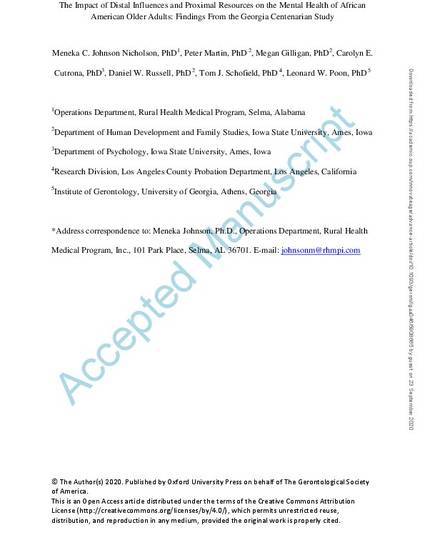
Background and Objectives: Over the years, a large amount of research has been devoted to the investigation of factors that led to mental health outcomes in older adults. For African American older adults, their lived experiences place them at high risk for mental health problems. The purpose of this study was to examine the impact of early life influences (i.e., education, childhood life events and childhood financial well-being) and present psychosocial resources (i.e., individual, financial, and social) on current mental health outcomes in a sample of African-American older adults in their 60s, 80s and 100s.
Research Design and Methods: Using data from the Georgia Centenarian Study, 125 participants were interviewed about their mental health, resources, and early life influences.
Results: A structural equation model was tested and resulted in a good fit. Results indicated that the more social resources African American older adults had available, the lower the number of depressive symptoms they reported. African Americans with higher levels of financial wellbeing during childhood reported higher self-rated mental health. Older adults had higher levels of financial resources. Level of education showed a positive relationship with financial resources. Indirect effects of distal influences on health outcomes via current resources were not found.
Discussion and Implications: The findings are of direct practical relevance and can be used to more readily identify older African Americans who may be susceptible to poorer mental health outcomes based upon the impact of their unique distal and proximal psychosocial resources.
Available at: http://works.bepress.com/carolyn_cutrona/44/

This accepted article is published as Johnson Nicholson, M.C., Martin, P., Gilligan, M., Cutrona, C.E., Russell, D.W., Schofield, T.J., Poon, L.W., The Impact of Distal Influences and Proximal Resources on the Mental Health of African American Older Adults: Findings From the Georgia Centenarian Study. Innovation in Aging, igaa046, doi: 10.1093/geroni/igaa046.